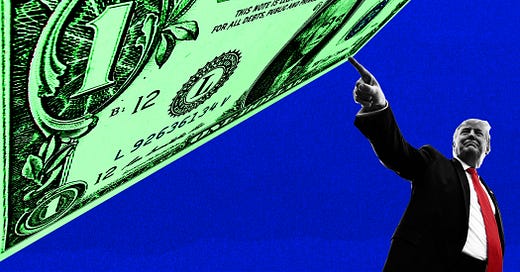Appeals Court Gives Trump the Gift of Smaller Bond, More Time
Not that he has done anything to deserve it.
DONALD TRUMP WAS HANDED a notable legal win on Monday, this time in the civil fraud case against him. A state appeals court halted New York Attorney General Letitia James’s ability to enforce the trial court’s $464 million judgment while Trump appeals—and deprived New York taxpayers of a bond covering the full judgment in the interim.
To translate what this means: The judgment against Trump last month included $355 million in penalties plus interest, now bringing the total to over $464 million. Under a New York statute, while he appeals, Trump is required to either pay up immediately or convince a bond company to promise to pay for him if he bails out for some reason, which would require paying a 20 percent premium to the bond company for that deal. That means putting up collateral worth $557 million, and apparently no bond company was willing to vouch for Trump to the tune of a half-billion dollars. Meanwhile, on February 28, Trump filed a motion with the appeals court asking that it stay James’s ability to immediately force him to pay up, offering to post a $100 million bond instead. James’s office objected, arguing that the law requiring a bond for the full $464 million is clear and that Trump can’t otherwise be trusted to pay the full judgment if he loses his appeal.
In its ruling on Monday, the appeals court didn’t lift the bond requirement, but cut by over 60 percent the amount of the bond needed to secure a stay of the judgment. Now Trump need find only $175 million. It also gave Trump a (possibly temporary) pass on a bunch of other things the trial court had ordered: (1) his former chief financial officer, Allen Weisselberg, is no longer permanently barred from serving in the financial control function of any New York corporation or similar business entity; (2) Trump and Weisselberg are no longer barred from serving as officers or directors of any New York corporation for three years; (3) Trump is no longer barred from applying for loans from New York financial institutions for three years; and (4) Donald Trump Jr. and Eric Trump are no longer barred from serving as officers or directors of any New York corporation in New York for two years.
These stays, which were granted pending Trump’s appeal, may be lifted at some point. But it must be noted that this is not business as usual in the legal world, and the appeals court didn’t offer any explanation for why it tipped the scales in Trump’s favor. James had already started the process of seizing his assets, filing the judgment with the clerk’s office in Westchester County, where his golf course and Seven Springs private estate are located, earlier this month. The New York statute requiring a bond for the full amount isn’t ambiguous about that requirement, and the appeals court didn’t offer a justification for sidestepping it. Also, Trump’s complaint that the $464 million judgment is “unprecedented, and practically impossible for ANY company” is overblown; large corporations have previously posted appellate bonds of $1 billion or more.
Finally, although there’s scant precedent for staying an appeal bond, what might be the closest case hailed from a different court and involved a judgment under a different state’s law. In 1985, a federal trial court in New York reduced a bond requirement for Texaco after Pennzoil won an $11.1 billion jury verdict in a Delaware court for interference with a contract between Pennzoil and Getty involving oil reserves. The federal court also banned Pennzoil from filing liens against Texaco during the appeal, and the U.S. Court of Appeals for the Second Circuit upheld the trial court’s ruling. But that case didn’t involve a government entity on the other side—like James’s case does. Given Teflon Don’s record, moreover, James’s office argued that “there is significant risk that absent a full bond or deposit, defendants will attempt to evade enforcement of the judgment or to make enforcement more difficult after an appeal.” The appeals court didn’t agree.
The decision might have something to do with the fact that the trial judge, Justice Arthur Engoron, appointed a retired federal judge, Barbara Jones, to indefinitely monitor the Trump organization in November 2022. Engoron also ordered Team Trump to inform Jones of any cash transfers, dissolution of assets, and “any efforts to secure surety bonds.” The appeals court left that part of Engoron’s order in place, ignoring James’s protestations that a monitor isn’t good enough to ensure that Trump plays by the rules. James wrote: “Notwithstanding the independent monitor that they now tout, in November 2023, defendants failed to disclose tax returns for six Trump Organization entities and transferred $40 million in cash (including $29 million to Mr. Trump) without informing the monitor beforehand, in violation of [the] Supreme Court’s orders.” Trump responded that “at no time during her tenure has Judge Jones ever identified any financial reporting misconduct, suspicious activity, or any suspected or actual fraud” on the part of the defendants.
Apparently, the New York appellate court bought the goods—what James’s office called the “‘trust us’ argument”—that Trump’s lawyers are touting. It may now be up to Jones to ensure that their client doesn’t ultimately dodge his obligations to the people of New York. Good luck with that.






